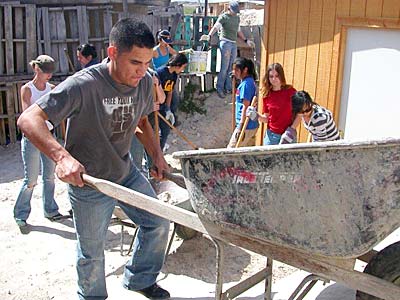UC Berkeley Web Feature
 |
Juan Salazar and fellow Berkeley students work to remove dried mud surrounding a Tijuana building. (Denise Fan photo) |
 Border Spring Break: Slide show Border Spring Break: Slide show |
A week of service and learning
at the border
'Alternative' spring break at
the U.S.-Mexico frontera offers students a personal
appreciation of immigration issues
BERKELEY – Immigration issues came alive over spring break for 25 UC Berkeley students, who spent the week in the San Diego-Tijuana border region as part of the campus's student-run Alternative Breaks program. Participants spent the first half of the trip in Tijuana visiting a migrant women’s shelter, touring maquiladora factories and neighboring barrios, and performing service projects for local community organizations. For the second part of the week, the group returned to the United States, where students learned about human trafficking, border militarization, and related border issues from law-enforcement officials and community organizers.
One of three spring break service-learning programs sponsored this year by Americorps through the university’s Cal Corps Public Service Center, the March 24-31 border visit was "designed to engage students with community issues on a personal level and serve as a springboard for effecting social change in their future endeavors," says trip co-leader Denise Fan, a junior majoring in political science.
Students were intentionally exposed to varied perspectives on the issues, she notes; both the Border Angels (which provides humanitarian aid to Mexican immigrants) and the U.S. Border Patrol were on the itinerary.
Prior to their visit, participants were required to take a semester-long course on border issues offered through the student-run DeCal program. The class provides academic context, notes Fan, while the border visit presents an opportunity to become "personally attached" to the issues and offer service.

